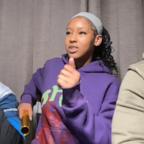
At least in Philadelphia, it's especially hard to poll Black voters. I know because I've tried.
Mary pointed out that there are some indications that polls could be overstating Harris' weakness with Black voters due to the difficulties in getting a representative sample among those voters. I wanted to add that polling is challenging in general, and polling Black voters is especially so.
After an election, pollsters calibrate for the future based on actual election results. But individual votes are of course private, so there's no gold standard that tells us how voters from certain demographic groups — including Black Americans — voted. And when pollsters do recalibrate after an election, they are far more likely to focus on the more numerous white voters.
It's also harder to recruit representative samples of Black voters in the first place. I recently co-authored an article, "Getting the Race Wrong," discussing the online and in-person surveys we conducted here in Philadelphia during the 2023 Democratic mayoral primary. In that race, our polls mirrored the public polls, getting the levels of support for Rebecca Rhynhart (the city's controller, who had significant support from Center City’s liberal neighborhoods) and Helen Gym (an at-large city councilmember who campaigned with Bernie Sanders and drew support from Philadelphia's most progressive neighborhoods) close to right.
But like the public polls, we significantly understated the support for the eventual winner, Cherelle Parker, a former city councilmember and state House representative. A big part of the reason why is that Parker dominated in Philadelphia's majority Black neighborhoods, in a city whose Democratic electorate is majority Black. Even when we upweighted the Black respondents who participated in our survey, our polls understated her support, in part because our Black respondents were significantly more likely to have a college degree than the general population of Black voters here in Philadelphia.







